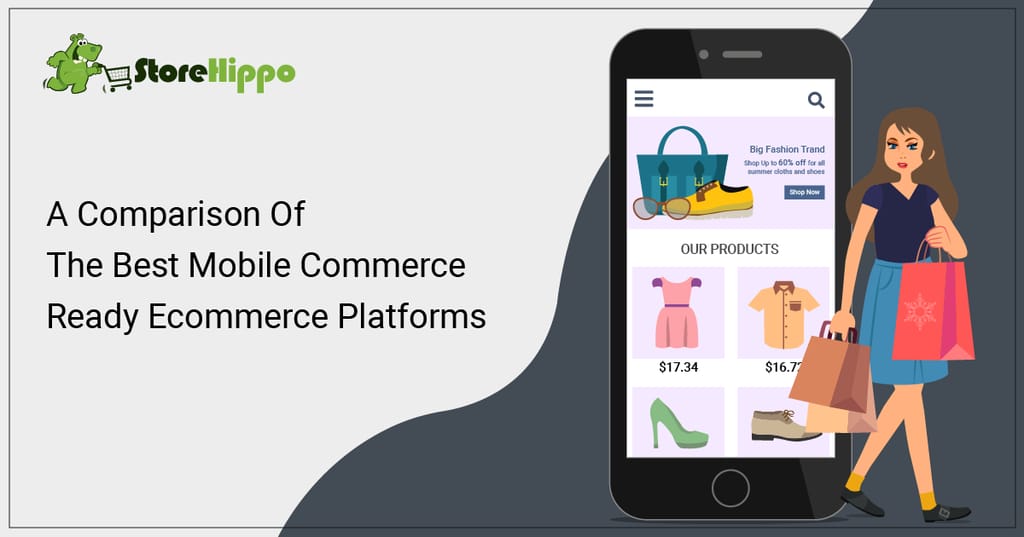Planning to amp up your online store to sell on mobile? Making strategies to tap new markets with m-commerce? Want to build ecommerce websites that offer seamless buying experience on all devices?
Are you answering, YES to all the above?
Congrats! You certainly are taking the best decision to future proof your business.
Table of Contents
- Wonder why M-commerce is the buzzword?
- Benefits Of Building A Mobile Commerce Ready Online Store
- How To Build The Best M-Commerce Websites For Your Business
- What Is A Mobile Commerce Platform
- Best Multi Commerce Platforms For Your Business
- Choosing The Best-Fit Mobile Commerce Platform For Your Business
Wonder why M-commerce is the buzzword?
With 70% - 80% of online orders already coming through mobile devices mcommerce is the way to go and make your own mark in the ecommerce industry.
Ecommerce is rapidly gravitating towards m-commerce. Global mCommerce revenue is expected to By 2021, global mCommerce revenue is forecasted to reach $3.56 trillion with an average y-o-y growth rate of 33.8%.
Source: Statista
With such encouraging figures adapting your online business for mcommerce is the best way to take competitive advantage of the market.
Benefits Of Building A Mobile Commerce Ready Online Store
By building the m-commerce ready sites your business can gain the following advantages:
- Offer easy store access to your customers on the go. They can order from you anytime, from anywhere with just a smartphone at their disposal
- Reach new untapped markets where customers have smartphones as the only medium to shop online
- Add news sales channel to your offline store by selling on mobile-ready online store
- Boost user engagement and sales with simple, one-click buying on wireless devices
- Go for personalized marketing with details of your customers’ online browsing and buying patterns
- Get bigger order size and more repeat orders as customers tend to order more on mobile devices
- Get better marketing ROI with easy retargeting through mobile apps
- Streamline order deliveries with location tracking using mobile tracking algorithms
Having mobile commerce ready online stores is the best way to take your online business to new heights of success.
How To Build The Best M-Commerce Websites For Your Business
Looking for options to build mobile-ready online stores easily? Wondering whether to go for custom solutions or the turnkey ecommerce platforms? Trying to find the best way out to build your mobile presence quickly without spending too much time, effort or resources?
Well, if you identify with these questions, finding a future-ready mobile commerce platform is the best bet for your business.
But do you actually understand what do the m-commerce platforms offer and why they are ideal for powering your online business?
Let’s delve deeper and understand everything about these platforms.
What Is A Mobile Commerce Platform
A mobile commerce platform is an m-commerce software solution that helps you build online stores designed to work seamlessly on all mobile devices. Right from adapting to small screen size to taking care of the special needs of customers who order using smartphones, these turnkey solutions give you everything needed to sell better on mobile devices.
Usually, these m-commerce platforms offer the following:
- Mobile ready stores without any additional coding
- Responsive themes optimized for various device-screens
- Easy and mobile-friendly checkouts
- Mobile optimization tools for better organic traffic
- Built-in features for a better mobile commerce shopping experience
- Mobile apps for better m-commerce presence and conversions
A turnkey m-commerce software gives you a tested solution to experiment with new marketing strategies for ecommerce. It helps you reach new markets and win loyal customers by offering them mobile-only offers.
Also, the best m-commerce solutions offer high-performance mobile sites that help in better customer engagement for higher conversions.
Best Multi Commerce Platforms For Your Business
Turnkey m-commerce solutions have made it easier for B2B and B2C businesses to expand their reach. Let us review the 5 best mobile commerce platforms for online businesses:
1. StoreHippo
StoreHippo is the leading mobile commerce platform for B2B and B2C businesses. Designed grounds up on the mobile-first principle StoreHippo builds high-performance, fast-loading mobile ready stores for businesses of all sizes.
StoreHippo is the pioneer of PWA for ecommerce. Basically, all stores built on StoreHippo are progressive web apps. This means that when opened in a browser these online stores look, feel and function like mobile apps. Also, PWA stores work on low connectivity and even when there is an intermittent loss of connectivity. PWA stores give a seamless buying experience even on entry-level devices
StoreHippo mobile commerce platform also offers mobile responsive themes for seamless UX on all devices. It also allows you to build Android and iOS apps right from the store’s admin panel without any additional coding or cost. You can also build store-specific apps for a multi-store set up at no additional cost. With its multilingual capabilities, StoreHippo supports multiple languages for mobile apps.
StoreHippo also has a host of inbuilt tools to help with mobile marketing. With the help of in-app notifications, it lets you engage customers in real-time. With 50+ integrated payment gateways, StoreHippo enables frictionless one-click checkout on all mobile devices.
StoreHippo mobile commerce platform also offers a mobile admin to run the business on the go. You also get social sharing options through mobile apps for various social platforms, WhatsApp etc which helps you have more customer touchpoints and better conversions eventually.
StoreHippo m-commerce features are available for all its plans.
2. Magento
Magento helps build mobile-ready online stores for small and large businesses. With Magento’s mobile commerce platform merchants can build mobile stores with responsive themes that fit various device screens.
The mobile-friendly checkout and integration with multiple payment gateways let merchants get mobile orders on the go. Magento also offers PWA which helps in building mobile sites that have the convenience of mobile apps and the searchability of desktop sites.
Magento also offers mobile optimization initiatives to help merchants improve their mobile experience. Magento’s mobile commerce platform also has Magento App Builders, extensions that let businesses build mobile apps for their business.
However, some users complain that these extensions are only temporary solutions and have multiple issues. They do not mirror all the features of the Magento store and fail to copy any customizations done. Also, most of the app builder extensions are compatible with a selected number of Magento versions. Also, community and enterprise editions are different making it difficult to have a seamless experience.
Along with these, implementing any changes to your apps would require an experienced Magento developer who can manage all the changes to your mobile site and update the app accordingly. Magento is also known to have security issues and the ongoing maintenance fee is also high.
3. BigCommerce
BigCommerce offers mobile commerce solutions to help businesses build their mobile presence. BigCommerce helps in building mobile-optimized pages for better performance and also offers mobile-optimized themes out of the box.
However, to have a fully functional mobile site with BigCommerce you will have to implement changes using extensions that cost on top of the regular subscription. Also, to build your mobile apps you will need to rely on extensions which need a significant understanding of the platform to fine-tune and sync your BigCommerce store and replicate all features as well as customizations on your mobile apps.
BigCommerce mobile commerce platform users have also complained about difficulties in implementing the changes and workarounds for a mobile-ready site. To make a mobile-ready site they have to rely on experienced developers who understand the platform and the extensions/apps. So you will have to bear the additional cost on top of your BigCommerce subscription, the extensions as well as having an IT team to have a fully functional mobile site and apps.
Some BigCommerce users also complain that it is not actually mobile commerce ready despite the claims.
4. Shopify
Shopify helps businesses sell on mobile devices by helping them build mobile responsive themes that work on screens of all sizes. The mobile checkout is designed to make payments on mobile devices easy with secure mobile carts.
However, since mobile was an afterthought and not part of the Shopify architecture there are certain issues reported by Shopify users while working on mobile sites for Shopify. Since Shopify is based on apps and extensions built by independent third-party providers, any extensions for mobile have the same issues.
You will either need to have good coding knowledge or need experienced developers who can make your site mobile-ready. Shopify mobile ecommerce platform offers third party mobile app builders that convert your Shopify store into mobile apps but yet again these are paid and need to be synced with your main store to reflect all the customizations and changes.
Also, since Shopify has apps based architecture syncing all the apps for your mobile store and mobile apps becomes cumbersome and also slows your site speed. The overall cost also snowballs due to multiple apps needed to run your online store, add features to your mobile app and make your Shopify store truly mobile-friendly.
4. WooCommerce
WooCommerce helps users to sell on mobile through plugin-based solutions to make your site mobile-ready. There are a host of plugins that help in optimizing images or help in making your site mobile-ready. Some of these plugins not only turn your regular store into a mobile store but also make it a quasi mobile app. WooCommerce also has mobile app builder plugins and extensions that help in building mobile apps for your WooCommerce store. You have to pay for these extensions and choose the one that best fits your requirements.
However, WooCommerce users always face issues with plugins as many of the popular plugins are not mobile-friendly. Making them work or finding workarounds and alternatives for mobile is a task in itself. It further needs experienced developers to help you implement the changes.
On top of this, the paid extensions for WooCommerce mobile commerce solutions can actually inflate your budget. To sync and finetune your extensions for mobile constant monitoring and updates would be required.
Also, as WooCommerce is self-hosted you will need an IT team to handle hosting, updates and overall maintenance. This makes the overall setup pretty costly as you have to bear the cost of hosting, upgrade, maintenance and hiring experienced developers.
Choosing The Best-Fit Mobile Commerce Platform For Your Business
Mobile commerce is the way to go for online businesses. It not only helps your business grow but also gives you better business insights for targeted marketing. It also helps you boost your conversions using marketing strategies designed for mobile sales.
However, to maximise your benefits from mobile commerce you need a solution that not only makes your online store mobile-ready but also offers comprehensive features and tools to leverage the technology to your advantage. While all the listed m-commerce platforms in this article offer solutions for building m-commerce ready online stores, you would need to evaluate each of them and see for yourself their merits and features suit your requirements.
Hope the detailed information presented in our article will help you make an informed decision and choose the best fit mobile commerce platform to grow your online business. Before signing the final documents, take care to check if the solution is ready to grow with your business and has other success stories where clients have scaled up and leveraged mobile commerce for their growth.
Ready to explore m-commerce solutions for your business? Start from the top one in the list by booking your StoreHippo free-trial now!






















































Leave A Comment